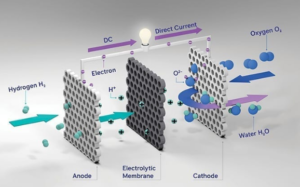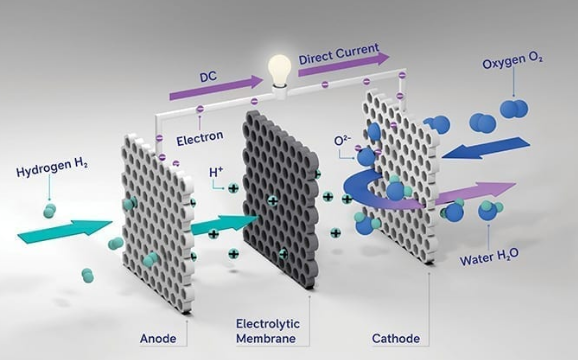Hydrogen fuel cells are a pivotal technology in engineering cleaner energy systems, offering an efficient and sustainable alternative to traditional fossil fuel-based power sources. Here’s an overview of how they work and their potential impact:
How Hydrogen Fuel Cells Work
- Core Principle: Hydrogen fuel cells convert chemical energy directly into electrical energy through an electrochemical reaction between hydrogen and oxygen.
- Key Components:
- Anode: Hydrogen gas (H₂) is supplied to the anode, where it splits into protons and electrons.
- Electrolyte: A proton-exchange membrane (PEM) allows only protons to pass through while blocking electrons.
- Cathode: Oxygen (O₂) is supplied to the cathode, where it combines with protons and electrons to form water (H₂O) as a byproduct.
- Output: The flow of electrons through an external circuit generates electricity, and the only emission is water vapor.
Benefits of Hydrogen Fuel Cells
- Zero Emissions: The only byproducts are water and heat, making it an environmentally friendly energy source.
- High Efficiency: Fuel cells are more efficient than internal combustion engines, particularly in converting fuel to usable energy.
- Energy Diversity: Hydrogen can be produced from various sources, including renewable energy (e.g., electrolysis using solar or wind power).
- Scalability: Fuel cells can power a wide range of applications, from small portable devices to large-scale industrial operations and vehicles.
Applications
- Transportation: Fuel cell electric vehicles (FCEVs) offer long-range capabilities and quick refueling, ideal for buses, trucks, and passenger cars.
- Stationary Power: Hydrogen fuel cells provide reliable backup power for data centers, hospitals, and remote areas.
- Portable Power: Used in devices such as drones and portable generators.
Challenges and Solutions
- Hydrogen Production: Most hydrogen today is produced from natural gas, emitting CO₂. Transitioning to green hydrogen (via renewable-powered electrolysis) is critical.
- Infrastructure: Developing a widespread hydrogen refueling network is necessary for mass adoption.
- Cost: The high cost of materials like platinum for catalysts and production processes can be mitigated through innovation and scaling.
The Future of Hydrogen Fuel Cells
Hydrogen fuel cells are poised to play a vital role in achieving net-zero carbon goals. Advances in production technology, infrastructure expansion, and international collaboration are accelerating their integration into the global energy landscape.
Would you like a detailed explanation of any specific aspect, such as the engineering design of a fuel cell, hydrogen production methods, or current market trends?

Also Read :
